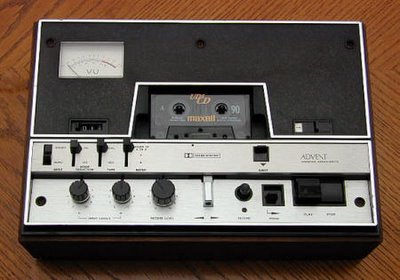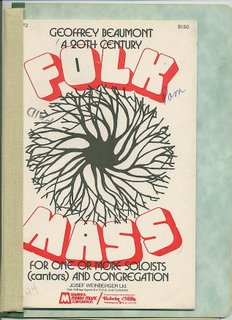File Sharing - 70s Style

The introduction of stereo cassette decks in the early Seventies was a true revolution, allowing us to copy our friends' LPs, make music tapes for cars and portables and record quality music from the radio. Pictured above is the Advent 201 - one of the first models to feature high-quality sound and Dolby noise reduction to help eliminate tape hiss. I had a TEAC model, which I purchased in 1974 for $200 at the Kings Plaza Mall.
Originally the cassette was a low-fi medium, used mostly to record meetings and dictation. Serious music listeners used 7 or 13-inch reel-to-reel machines, which recorded at either 7.5 or 15 inches-per-second on 1/4-inch tape. There were even a few albums released on reel tape; my cousin had one by Santana. Then there was the 8-track cartridge, about which I'll do a separate entry shortly. 8-track cartridges usually came pre-recorded, and most folks listened to them in automobiles. Few decks existed which could record them.
One of the great things about the cassette was that its patent-holders insisted that the format be standardized. Any cassette could be played on any deck or player. With time, advances in technology allowed for the tapes to hold four tracks : two stereo tracks for each side. But it was Dolby B noise reduction that really made the cassette a serious music resource. The principal was simple: boost the high frequencies in the recording phase, then lower them back for playback. This substantially lowered the annoying hiss heard in the background. A good cassette could also hold up to 45 minutes per side, which was enough to record most albums of the day.
Not surprising, people were soon using cassette decks to copy their friends' albums, and to make copies of their own records to be played back in their cars or on portables. As the 70s moved on, the 8-track format faded, and more and more cars were coming with cassette players. Also, around 1974 came the early "Ghetto Blasters," as boom boxes were then called. These monsters ate batteries at an incredible rate, and cost upwards of $200 back then! Still, they were popular for those of us who liked to hang around outside.
Then there was the radio. The Seventies saw the peak of quality radio on stations with either no play lists or rather broad ones. All on FM, these stations did not feature disk jockeys who talked over the music, making it possible for us to tape them. Also in the early Seventies came the advent of live concert broadcasts, both on FM and television. Who can forget ABC's "In Concert" or NBC's "The Midnight Special?" I recall seeing a rather humble-looking singer/songwriter named Billy Joel making his debut on one of these shows.



